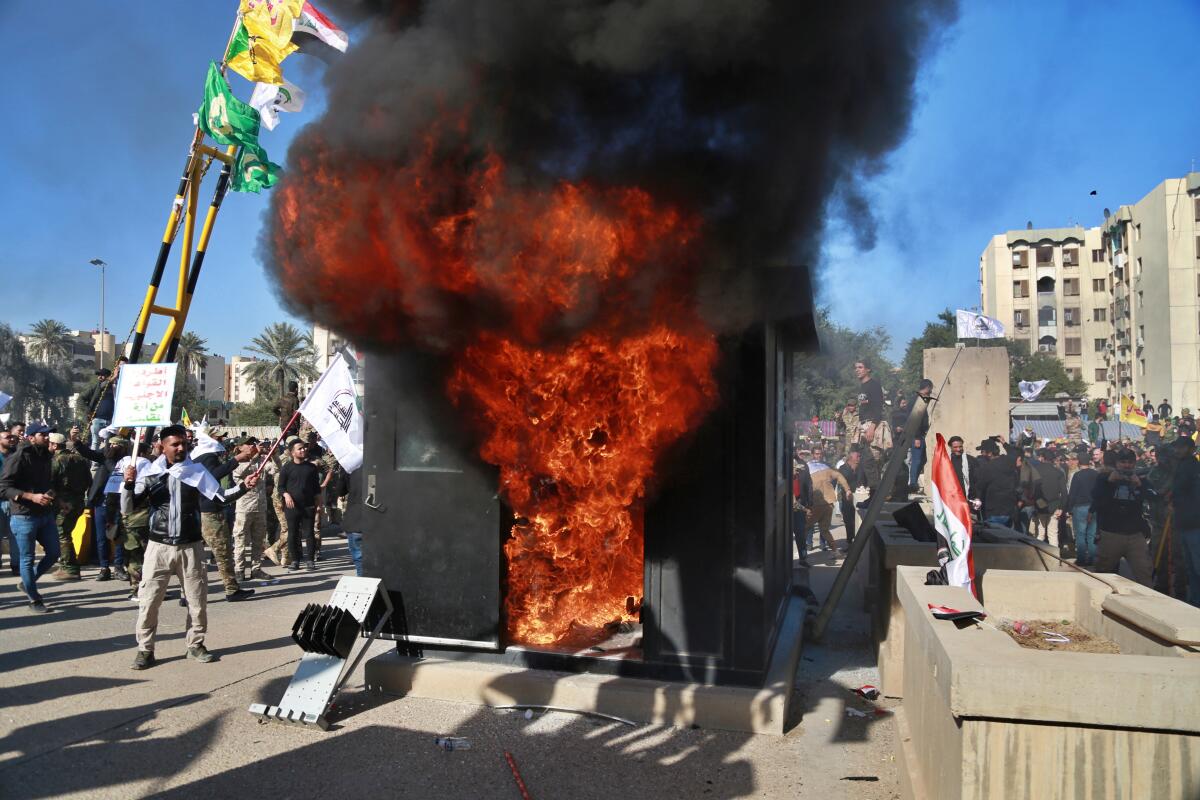Happy New Year! But not for long

- Share via
WASHINGTON — In each of the last 12 years, the Council on Foreign Relations has surveyed more than 500 foreign policy experts to find out what worries them most about the year ahead.
In 2020, the answer is just about everything.
“We’ve never seen this level of anxiety in the past,” Paul B. Stares, who runs the survey, told me. “There’s tremendous concern about where the world is going and what it means for the United States.”
The foreign policy mavens’ top worries are cyberattacks from Russia, China and other countries; terrorism, inspired by foreign groups like Islamic State or carried out by domestic extremists; and escalating U.S. conflict with Iran.
Note that those problems aren’t hypothetical; they’re happening already.
Next, add simmering tensions on the Korean peninsula and in the South China Sea; the conflict between Russia and Ukraine; violence-fed instability in Central America and Mexico; and the wars in Syria and Afghanistan.
Now add another factor: This is a U.S. election year. That tempts foreign countries and terrorist groups to see what they can get away with.
“Election years — times of political transition or potential political change — are always periods of heightened vulnerability for any country,” Suzanne E. Fry, one of the CIA’s top analysts, said when the survey was released. “The United States is no exception.”
FBI Director Christopher A. Wray has warned Congress that he expects Russia and other countries to try to intervene in the presidential election, both by using social media to spread propaganda and disinformation, and by trying to hack into election software used by local governments.
Russia did all that in 2016. This time, China, North Korea and Iran could try, too.
Terrorists also can have outsized effects in an election year. In 2004, Al Qaeda leader Osama bin Laden released a videotape taunting then-President George W. Bush only four days before the election. The gambit backfired; it helped Bush win.
During the 2016 campaign, terrorist attacks in San Bernardino and Orlando, Fla., probably boosted the prospects of then-candidate Donald Trump, who argued that the United States needed stricter immigration polices to stop the violence.
Countries that use military power to intimidate their neighbors — including Russia (in Ukraine), China (in the South China Sea), North Korea (South Korea and Japan) and Iran (much of the Middle East) — may be tempted to escalate in an election year to see if a U.S. president hesitates to push back.
Iran, whose allies attacked U.S. forces in Iraq last week, appears to be using that strategy already.
Or they may try the opposite tack — offering deals to a president who wants something to show U.S. voters in an election year. He might try to strike a splashy deal with Kim Jong Un, the dictator of North Korea, or a quick peace agreement with the Taliban in Afghanistan. Just be sure to check the fine print.
On Tuesday, Trump boasted that he will sign a “very large and comprehensive Phase One trade deal with China” in the White House on Jan. 15, and that he will travel to Beijing later this year to seek a wider agreement.
Trump has announced this same “phase one” trade deal several times now. Despite his grand claims, it appears quite limited, not “large and comprehensive.” And the Chinese have confirmed neither a White House signing nor a Beijing visit.
The heightened pressures of an election year can make it harder to keep foreign policy on an even keel, especially for a president who’s running for a second term.
But in Trump, we have a president who doesn’t mind international disruption; he embraces it as a principle.
And that leads to the biggest worry for foreign policy experts: The world is becoming unglued, and the Trump administration appears less interested than its predecessors in acting as a global stabilizer.
“The U.S. president historically has been a source of reassurance about rules and norms in the international system,” Stares said. “This president is not. All the certainties we once had about international norms and alliances have been fundamentally weakened, and President Trump is one of the reasons.”
Trump isn’t the only reason there’s instability in the world; most of those problems were already there, and would have bedeviled any president. But Trump has made many of them worse, not better.
So, two thoughts as we begin this election year.
One is: Fasten your seat belt. There are surprises ahead, many of them unpleasant.
The second is: Foreign policy belongs on the ballot this fall.
Trump has sought to change our global role in a fundamental way. He’s making the United States a disrupter instead of a stabilizer.
So far, his foreign policy has produced neither great successes nor catastrophes. But he’s only been in office three years; in eight years, his impact will be far greater — and more disruptive.
Before I forget: Happy New Year.
More to Read
Get the L.A. Times Politics newsletter
Deeply reported insights into legislation, politics and policy from Sacramento, Washington and beyond. In your inbox twice per week.
You may occasionally receive promotional content from the Los Angeles Times.











